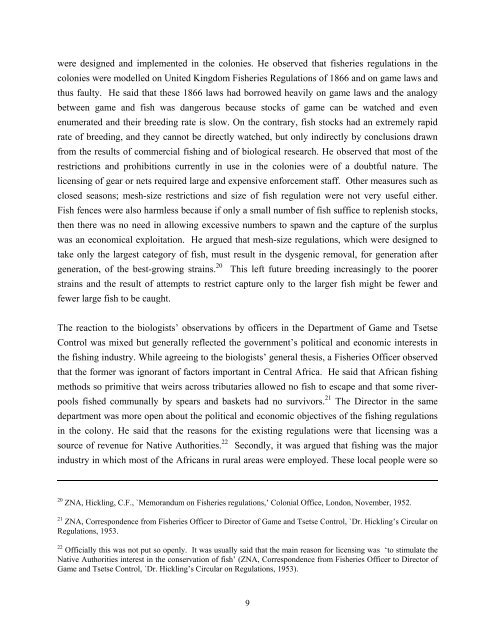The emergence of fisheries legislation and regulations in Zambia ...
The emergence of fisheries legislation and regulations in Zambia ...
The emergence of fisheries legislation and regulations in Zambia ...
You also want an ePaper? Increase the reach of your titles
YUMPU automatically turns print PDFs into web optimized ePapers that Google loves.
were designed <strong>and</strong> implemented <strong>in</strong> the colonies. He observed that <strong>fisheries</strong> <strong>regulations</strong> <strong>in</strong> the<br />
colonies were modelled on United K<strong>in</strong>gdom Fisheries Regulations <strong>of</strong> 1866 <strong>and</strong> on game laws <strong>and</strong><br />
thus faulty. He said that these 1866 laws had borrowed heavily on game laws <strong>and</strong> the analogy<br />
between game <strong>and</strong> fish was dangerous because stocks <strong>of</strong> game can be watched <strong>and</strong> even<br />
enumerated <strong>and</strong> their breed<strong>in</strong>g rate is slow. On the contrary, fish stocks had an extremely rapid<br />
rate <strong>of</strong> breed<strong>in</strong>g, <strong>and</strong> they cannot be directly watched, but only <strong>in</strong>directly by conclusions drawn<br />
from the results <strong>of</strong> commercial fish<strong>in</strong>g <strong>and</strong> <strong>of</strong> biological research. He observed that most <strong>of</strong> the<br />
restrictions <strong>and</strong> prohibitions currently <strong>in</strong> use <strong>in</strong> the colonies were <strong>of</strong> a doubtful nature. <strong>The</strong><br />
licens<strong>in</strong>g <strong>of</strong> gear or nets required large <strong>and</strong> expensive enforcement staff. Other measures such as<br />
closed seasons; mesh-size restrictions <strong>and</strong> size <strong>of</strong> fish regulation were not very useful either.<br />
Fish fences were also harmless because if only a small number <strong>of</strong> fish suffice to replenish stocks,<br />
then there was no need <strong>in</strong> allow<strong>in</strong>g excessive numbers to spawn <strong>and</strong> the capture <strong>of</strong> the surplus<br />
was an economical exploitation. He argued that mesh-size <strong>regulations</strong>, which were designed to<br />
take only the largest category <strong>of</strong> fish, must result <strong>in</strong> the dysgenic removal, for generation after<br />
generation, <strong>of</strong> the best-grow<strong>in</strong>g stra<strong>in</strong>s. 20 This left future breed<strong>in</strong>g <strong>in</strong>creas<strong>in</strong>gly to the poorer<br />
stra<strong>in</strong>s <strong>and</strong> the result <strong>of</strong> attempts to restrict capture only to the larger fish might be fewer <strong>and</strong><br />
fewer large fish to be caught.<br />
<strong>The</strong> reaction to the biologists’ observations by <strong>of</strong>ficers <strong>in</strong> the Department <strong>of</strong> Game <strong>and</strong> Tsetse<br />
Control was mixed but generally reflected the government’s political <strong>and</strong> economic <strong>in</strong>terests <strong>in</strong><br />
the fish<strong>in</strong>g <strong>in</strong>dustry. While agree<strong>in</strong>g to the biologists’ general thesis, a Fisheries Officer observed<br />
that the former was ignorant <strong>of</strong> factors important <strong>in</strong> Central Africa. He said that African fish<strong>in</strong>g<br />
methods so primitive that weirs across tributaries allowed no fish to escape <strong>and</strong> that some river-<br />
pools fished communally by spears <strong>and</strong> baskets had no survivors. 21 <strong>The</strong> Director <strong>in</strong> the same<br />
department was more open about the political <strong>and</strong> economic objectives <strong>of</strong> the fish<strong>in</strong>g <strong>regulations</strong><br />
<strong>in</strong> the colony. He said that the reasons for the exist<strong>in</strong>g <strong>regulations</strong> were that licens<strong>in</strong>g was a<br />
source <strong>of</strong> revenue for Native Authorities. 22 Secondly, it was argued that fish<strong>in</strong>g was the major<br />
<strong>in</strong>dustry <strong>in</strong> which most <strong>of</strong> the Africans <strong>in</strong> rural areas were employed. <strong>The</strong>se local people were so<br />
20 ZNA, Hickl<strong>in</strong>g, C.F., `Memor<strong>and</strong>um on Fisheries <strong>regulations</strong>,’ Colonial Office, London, November, 1952.<br />
21 ZNA, Correspondence from Fisheries Officer to Director <strong>of</strong> Game <strong>and</strong> Tsetse Control, `Dr. Hickl<strong>in</strong>g’s Circular on<br />
Regulations, 1953.<br />
22 Officially this was not put so openly. It was usually said that the ma<strong>in</strong> reason for licens<strong>in</strong>g was ‘to stimulate the<br />
Native Authorities <strong>in</strong>terest <strong>in</strong> the conservation <strong>of</strong> fish’ (ZNA, Correspondence from Fisheries Officer to Director <strong>of</strong><br />
Game <strong>and</strong> Tsetse Control, `Dr. Hickl<strong>in</strong>g’s Circular on Regulations, 1953).<br />
9

















